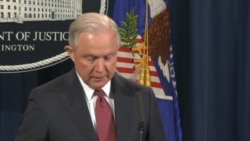The United States has ended a program that shielded nearly 800,000 young, undocumented immigrants from deportation and allowed them to work and study in the country.
New applications for the Deferred Action for Childhood Arrivals program, known as DACA, will no longer be accepted, administration officials said.
President Donald Trump approved the decision but sent Attorney General Jeff Sessions before news cameras Tuesday to announce the controversial policy change.
“DACA is being rescinded,” Sessions announced. The action revoked an executive order former President Barack Obama issued five years ago.
Demonstrators opposed to the administration's decision massed in Washington, Los Angeles, New York, Denver and other cities.
Activist Gustavo Torres told a crowd outside the White House: “This president lied to our community. ... He told us, ‘I have a big heart for you dreamers.’ He's a liar!”
The future status of the hundreds of thousands of young, foreign-born students and workers is unclear for now, since they are no longer protected from summary deportation by the DACA program. Congress will have six months to act if it wants to continue to allow them to remain in the United States.
The young immigrants, also colloquially known as “dreamers,” typically entered the United States as young children. Many trace their heritage to Mexico or Central American countries, but some arrived so young that they have grown up knowing nothing other than American society and customs.
Anyone who joined the “deferred action” program for work and study was required to have and maintain a clean criminal record. DACA did not promise participants citizenship or permanent U.S. residency, instead promising a reprieve from deportation. The program was initially intended as a stop-gap measure to protect aspiring young immigrants, while Congress was to come up with a more lasting solution to their problems.
“I have a love for these people,” Trump said at the White House late Tuesday, “and hopefully now Congress will be able to help them and do it properly.” Earlier he had issued only a written statement stating that federal immigration patrols would not make seeking out DACA recipients for detention and deportation a priority issue.
Obama criticizes move
Former President Obama, who has refrained from commenting on most of the policy changes Trump has enacted this year, spoke out strongly against ending the DACA program, and said the current administration was carrying out a purely political decision and targeting young people who “have done nothing wrong.”
Obama said ending DACA was “self-defeating” and “cruel,” whether considered in political, economic or moral terms, “because (the young immigrants) want to start new businesses, staff our labs, serve in our military, and otherwise contribute to the country we love.”
“Let's be clear: the action taken today isn't required legally. It's a political decision, and a moral question. Whatever concerns or complaints Americans may have about immigration in general, we shouldn't threaten the future of this group of young people who are here through no fault of their own, who pose no threat, who are not taking away anything from the rest of us,” Obama wrote.
Officials of the Department of Homeland Security, which includes immigration and border-patrol officers, told reporters Tuesday they would not actively pursue the people who had been protected by DACA, at least for the next six months. However, many of the young people who have now become vulnerable to immigration action said they are greatly worried about the future.
“This is the only country and the only place that I know is home,” Sarai Bravo told VOA in New York City. “I’m not planning on leaving unless I'm forced to. So I'm going to continue fighting, coming with the rest of the community and encouraging people to come out and fight. That is my plan, trying to stay here forever,” she said.
Action by Congress is not certain. Lawmakers have been unsuccessful for years in their efforts to revise substantially U.S. immigration policies. During Obama's eight years as president, the Senate — controlled by members of his Democratic Party for most of that time — approved major policy changes only to see the legislation fail in the Republican-controlled House of Representatives.
A campaign promise kept
Trump cited that history in a tweet late Tuesday.
“Congress now has 6 months to legalize DACA (something the Obama administration was unable to do). If they can't, I will revisit this issue!”
Trump's campaign promises included a vow to eliminate DACA, although he also eased up on that anti-immigrant rhetoric on a number of occasions. Since his inauguration in January, however, the president has strengthened and prioritized the country's deportation system, calling for the hiring of thousands more immigration and border agents.
In his statement issued after Sessions's announcement, Trump said: “I do not favor punishing children, most of whom are now adults, for the actions of their parents. But we must also recognize that we are (a) nation of opportunity because we are a nation of laws.”
Sessions, an immigration hard-liner who had pressed Trump to end the program, said: “We cannot admit everyone who wants to come here. All cannot be accepted.” Limiting immigration, he added, “means we are properly enforcing our laws.”
The attorney general took no questions from reporters.
March 5, 2018
Once current DACA status expires for current recipients, they could be subject to deportation proceedings if detained. DACA recipients whose permits expire before March 5, 2018 will be allowed to renew their status, but they must act within one month. DHS officials said no other renewal requests would be considered and all new applications will be rejected.
The acting chief of the Department of Homeland Security, Elaine Duke, said “the administration's decision to terminate DACA was not taken lightly.”
“The Department of Justice has carefully evaluated the program's constitutionality and determined it conflicts with our existing immigration laws,” she said.
Ramon Taylor contributed to this report









